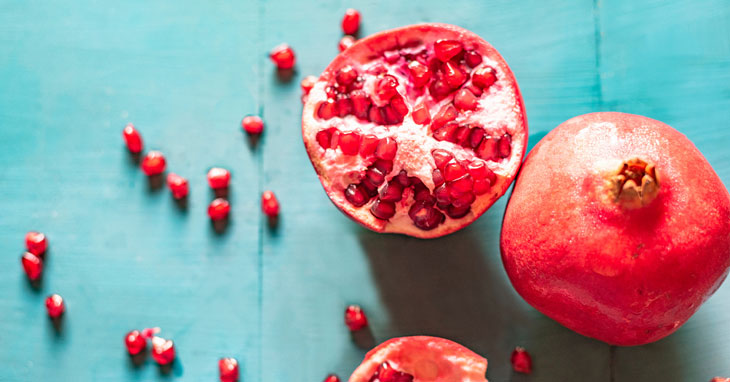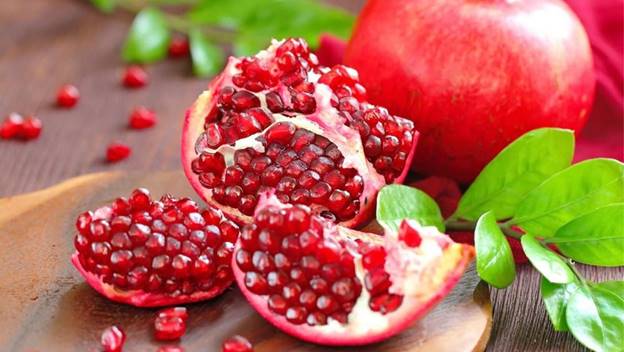Pomegranates are sweet, aromatic and contain many plant compounds that are very good for health, helping the body prevent many diseases effectively. The information below will help you better understand the health benefits of pomegranates and some notes when eating this fruit to get the maximum nutritional value.
1. Nutrients in pomegranate
Pomegranate is a red berry, round in shape, about 5 to 12 cm in size. The outer shell of this fruit is quite thick and inedible. Inside this shell are hundreds of pomegranate seeds, each of which is surrounded by a red seed coat, which is juicy and sweet. You can eat it directly or squeeze it into juice

Pomegranate contains many nutrients
Compared to many fruits, the nutritional value of pomegranate is much more prominent. It is estimated that about 174g of pomegranate peel contains
– 7g of fiber.
– 3g of protein.
– Many vitamins such as vitamin C, vitamin K, folate, potassium, phosphorus and calcium, …
– In particular, pomegranate contains 2 compounds with strong medicinal properties:
+ Punicalagin: This antioxidant compound is abundant in the pomegranate peel. According to some studies, the antioxidant activity in this fruit is even many times higher than that of green tea and red wine.
+ Punici Acid
+ Punicic Acid: This is a type of linoleic acid that is abundant in the seed peel and has extremely strong biological effects.
2. What health benefits can pomegranate bring?
If supplemented properly and reasonably, pomegranate can bring many health benefits, specifically as follows:
– Has a strong anti-inflammatory effect: When the body is faced with a chronic inflammation, it can cause a series of very serious health problems such as cardiovascular disease, cancer, dementia, diabetes or obesity, etc. The reason this fruit has a strong anti-inflammatory effect is because it contains the antioxidant compound punicalagins.
– Helps lower blood pressure: People with high blood pressure may face many health risks, especially stroke. Some ingredients in pomegranate seeds can block the activity of the angiotensin converting enzyme in the serum and can reduce systolic blood pressure.
– Reduce the risk of cardiovascular disease: When eating pomegranate, your body will be supplemented with Punicic fatty acid, which helps prevent the formation and progression of some cardiovascular diseases. Moreover, adding pomegranate to your diet can also help reduce triglycerides and increase triglyceride-HDL, reduce the risk of plaque formation on the artery wall and thereby help prevent cardiovascular disease more effectively.
– Support against bacterial and fungal infections: Some compounds in pomegranate help the body prevent and fight the growth of some microorganisms that are harmful to health such as Candida albican yeast.
Pomegranate juice is also used as a very effective antiseptic solution without causing side effects. Pomegranate juice can inhibit bacteria in the oral cavity and help prevent periodontitis. Regularly rinsing your mouth with pomegranate juice can also remove plaque on your teeth.
– Improve memory: Antioxidants in pomegranate juice can help improve memory and prevent the progression of Alzheimer’s disease. Pregnant women can also add pomegranate to their daily diet to protect the fetus’s nerves. Some studies also show that pomegranate juice is very good and can reduce the risk of brain damage in cases of children with developmental delays.
– Good for reproductive health: Pomegranate juice contains a large amount of antioxidant compounds and helps reduce oxidative stress, thereby supporting the prevention of sperm dysfunction and is very good for health as well as ensuring fertility. In addition, supplementing pomegranate juice is also a way to increase testosterone in men and help them be more interested in “bedtime stories”.
In addition to the health benefits mentioned above, pomegranate juice is also said to have the ability to prevent prostate cancer, prevent breast cancer, … However, more research is still needed to provide more specific and clear evidence.
3. Some notes when eating pomegranates
Here are some things to note when eating pomegranates:
– Should you eat pomegranate seeds?
According to Oriental medicine, pomegranate seeds are very good, cool and have the ability to disinfect, very effective in treating diarrhea or bloody stools. Pomegranate seeds also promote the body to produce collagen and help strengthen bones. In addition, vitamin K and vitamin C in pomegranates also have the effect of beautifying the skin. Pomegranate also contains a lot of fiber and helps you lose weight effectively. Therefore, you can eat pomegranate seeds but in moderation.
Do not swallow pomegranate seeds but chew them thoroughly before swallowing to avoid intestinal obstruction if you eat too many seeds at once. Children should not eat pomegranate seeds because they can easily choke, which is extremely dangerous. The advice for you is to squeeze pomegranate juice to take full advantage of the nutrients in this fruit.
– Cases that should not eat pomegranate are those with severe constipation, people with dental problems, people with internal heat, etc.
– Do not eat too much pomegranate to avoid causing unnecessary health problems.
– Do not eat pomegranate with apricots and milk to avoid affecting the body’s digestion and absorption of nutrients.

Eat only in moderation, avoid eating too much pomegranate
– If after eating pomegranate, the body shows unusual symptoms, you should go to the doctor for examination and early treatment.
Hopefully the above information has helped you better understand the nutritional value and some notes when eating pomegranate.





